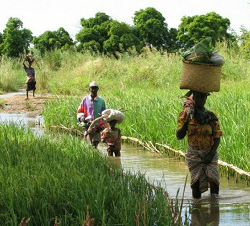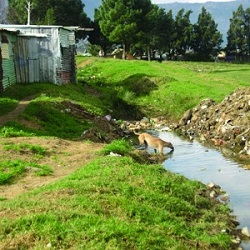Selected to drive research in a strategic manner, UCT's research institutes have been established either as the result of a competitive selection process or to strengthen institutional, regional and national priorities.

African Climate and Development Initiative (ACDI
South Africa, with the rest of Africa, has an imperative to improve human well-being, but within the constraints of the need for low-carbon development and mounting impacts of climate change. The African Climate and Development Initiative (ACDI) engages with these issues through innovative research and teaching. An interdisciplinary research hub, it brings together academics with non-governmental organisations, business and government to produce and test new insights, evidence and innovations that will help to solve Africa's climate and development challenges.

Future Water
Future Water's ultimate objective is to improve the quality of life and sustainable development in South Africa through a greater sensitivity to water resources. The research programme focuses on the interactions between environmental, technical, economic and social aspects through the adoption of 4 thematic areas:
Lead researcher: Professor Sue Harrison

Institute for Communities and Wildlife in Africa (iCWiLD
The Institute for Communities and Wildlife in Africa (iCWiLD) is dedicated to understanding and reducing conservation conflicts. This requires an interdisciplinary approach. While biology and sociology represent core research areas, conservation also requires a deeper understanding of the historical and socio-economic background to these conflicts. There is a widening acceptance that slowing the current rate of biodiversity loss demands shift in the way humans perceive their role in, and interdependence on, natural systems. The institute challenges the divide between the arts and hard sciences as it strives to understand and ultimately guide the realignment between humans and the natural systems we depend on.
Lead researcher: Professor Justin O'Riain

Institute for Democracy, Citizenship and Public Policy in Africa
The Institute for Democracy, Citizenship and Public Policy in Africa conducts comparative empirical studies of contemporary African democracy. Previous research has demonstrated that democracy needs effective and predictable political institutions, and an active and critical citizenry, as well as public policies that enable inclusive growth and rising welfare. The institute investigates each of these 3 areas with democracy being the guiding theme that binds them together.
Lead researcher: Professor Jeremy Seekings

Institute of Infectious Disease and Molecular Medicine (IDM
The Institute of Infectious Disease and Molecular Medicine (IDM) is a postgraduate research enterprise that operates in the fields of infectious disease and molecular medicine. Established in 2004, the IDM has become the largest research entity at UCT and a national leader in research and human capital development in the field of health sciences. The IDM's laboratory-clinic-community approach engages a wide range of scientific and clinical disciplines.

Neuroscience Institute
Over the past decade, neuroscience has become a priority for many universities, but the vast majority of brain and behavioural research has focused on WEIRD populations – westernised, educated, industrialised, rich and democratic. There is a major research gap when it comes to understanding the impact of many brain disorders in Africa. These conditions need to be understood in context, as some conditions – such as traumatic brain injury and the neurological and neuropsychiatric consequences of HIV and TB – are far more prevalent here than elsewhere.
The Neurosciences Institute draws together expertise in the basic sciences, public health and a wide array of other disciplines to advance our understanding of the brain. The institute advances patient care while fostering research, education and advocacy in the fast-moving and exciting world of neuroscience.

Poverty and Inequality Initiative (PII
The Poverty and Inequality Initiative (PII) tackles the question of why, in a country of rich resources, poverty and inequality are persisting and, in the case of inequality, deepening. PII includes high-profile members from diverse disciplines and aims to identify all major role players inside and outside the university, who are working in the field of poverty alleviation. In addition, the PII plays a leading role in the Carnegie National Inquiry into strategies to overcome poverty and inequality. PII initiatives use focused research, broad engagement and collaboration within and beyond the university environment to tackle these issues.